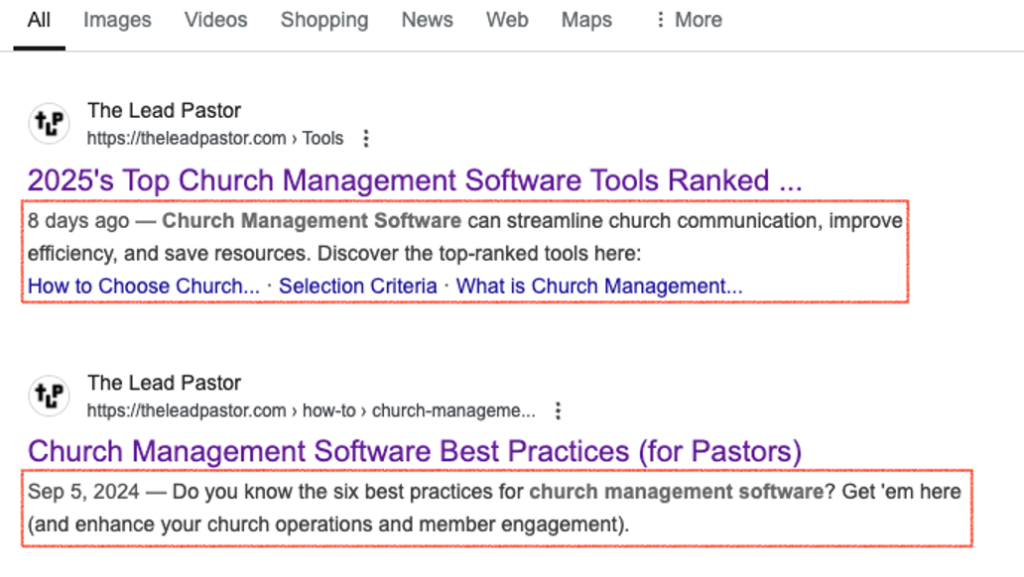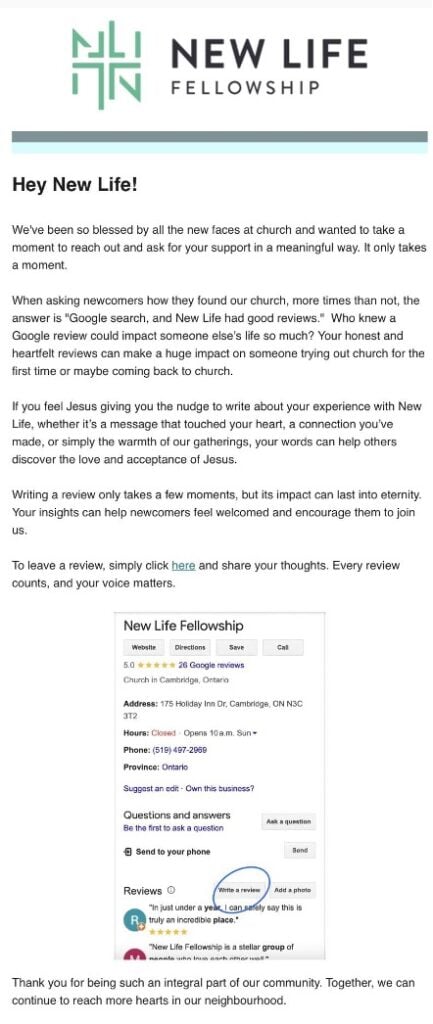Claim and update your Google My Business profile: Ensure your church’s name, address, phone number, service times, and website are up-to-date and accurate.
Select a few simple keywords: Incorporate 'church in [your town]' or 'Sunday services in [your town]' naturally into your website’s homepage, service pages, and blog posts.
Audit your site’s performance: Check site speed, mobile usability, and basic SEO settings to ensure a user-friendly experience.
Engage your community: Encourage members to leave reviews, share your posts, and help spread your church’s message online.
Ever feel like your church website is the best-kept secret on the internet? Search Engine Optimization (SEO) is, for nonprofits (especially churches), often the missing ingredient in outreach efforts. Let’s face it: if your church is lost on page 12 of search results, it’s hard to grow your impact.
Without a good grasp of SEO, you might notice:
- New visitors struggle to find your church online (and in person!)
- Your social media posts and announcements don’t seem to reach anyone outside your core members
- You feel like you’re speaking into the digital void
These challenges happen because the online world has its own rules—and if your church isn’t both aware of AND following them, you’re missing low-hanging fruit!
Explore why SEO matters and how it can help your church grow its presence and fulfill its mission. (And, if you’re wondering, YES: your church website building software likely offers SEO support!)

Understanding SEO For NonProfits: A Primer For Church Leaders
SEO, or Search Engine Optimization, is ultimately about making your church's website easier to find when people search for you on Google. Paying attention to SEO ensures your website shows up in the church results.
- The bad news: SEO is a deep rabbit hole… the deeper you go, the more complex and difficult it gets.
- The good news: there are a few simple things you can do to boost your church's visibility online.
- The GREAT news: you don’t need a big budget or tech team to get started.
In today’s digital world, SEO is a must for getting noticed and growing your church. And it’s easier than you think!
The Benefits of an Effective SEO Strategy for Nonprofits
When diving into SEO for nonprofits and churches, strategy is key! I hope that after reading this article, you'll have a clearer understanding of a strategy that works well for your church. I recently spoke with Olivia Maclean, the SEO manager for TheLeadPastor.com - and she emphasized that SEO is not a one-and-done task. In her words:
Ideally, SEO is something nonprofits (and churches) update regularly. Refresh your ‘about’ page every six months. Post about events or community activities on your website calendar. That'll go a long way!
Olivia MAclean, SEO Manager
The result of this?
- Enhanced visibility to attract new members: A well-optimized, up-to-date church website makes it easier for people searching for a church or community event to find you online. More visitors = potential new members.
- Improved engagement with the congregation: Fresh content like sermon archives, event listings, and Blog posts keep your current members informed and engaged. More engagement = deeper connection and a stronger sense of community.
- Support for community outreach and evangelism efforts: A strong online presence helps you share your church’s mission, promote outreach programs, and invite newcomers to community events.
- Increased credibility and trust: A well-maintained website and active social media presence show that your church is reliable, welcoming, and a vibrant part of the community.
Regularly refreshing even the simplest parts of your church’s website not only boosts visibility but also signals to search engines that your site is active and relevant. This is where SEO for nonprofits and churches can really kick in, driving more traffic and engagement!
7 Basic Terms To Learn
When it comes to SEO, understanding a few key terms will make a big difference in your Success. These basics will help you navigate the process with confidence, giving you the tools you need to grow your church's online presence without feeling overwhelmed!
‘Keyword’
A keyword is a word or phrase people type into Google to find information. For example, if someone in your city searches for “Family-friendly church in Seattle,” that's a keyword.
By using keywords like this on your page titles and headings, you help search engines link your site to those searches, making it more likely that people will find your church.
Helpful Tools:
- Google Keyword Planner: This free tool makes it simple to discover what people are searching for in your area. Enter terms like “church near me” or “children's ministry,” and it will show you similar keywords and how often they are searched. This helps you choose the right words to include on your site.
- SEMrush or Ahrefs: These advanced tools give you insights into how your site is performing for specific keywords and what terms your competitors are ranking for. They make it easier to refine your strategy and target the keywords that can drive more visitors to your website.
‘Local Seo’
Local SEO helps your church rank higher in local search results, making it easier for people in your area to find you. When someone searches for "church near me" or "Sunday services in Seattle" you want your church to show up.
To boost your visibility, ensure your church’s name, address, and phone number are accurate on platforms Like Google Maps and Yelp. Encouraging reviews from church members can also help. Adding location-specific keywords to your website, like "community-focused church in Cincinnati," will further improve your chances of being found by local visitors!
‘Meta Description’
A meta description is a short, punchy snippet of text—usually 150-160 characters—that appears below your webpage title in search engine results. Think of it as your website’s mini sales pitch: it tells potential visitors what to expect if they click your link.

A strong meta description can make all the difference between someone scrolling past your site and clicking to learn more. It helps search engines understand your content while enticing users to visit your site.
PRACTICAL TIP: Make sure each page on your church website has a unique meta description tailored to the page’s purpose. For example, use a welcoming tone on your “New Here” page, and spotlight opportunities on your “Volunteer” page. This not only helps search engines categorize your site but also ensures you attract the right audience.
‘Site Speed’ & ‘Performance’
Site speed refers to how quickly the pages on your website load when visitors click on them. I can’t stress enough how important this is for user experience—no one wants to stare at a spinning wheel or wait forever for a page to load. Slow site performance leads to frustration, and frustrated visitors will quickly click away.
Site performance goes hand-in-hand with speed and focuses on how efficiently your website runs overall. A fast, well-optimized site keeps people engaged and improves their experience, helping them find what they’re looking for—without the wait.
Best Practices:
- Optimize images: Compress large files without losing quality using tools like TinyPNG to reduce load times and enhance user experience.
- Minimize clutter: Remove unnecessary plugins and scripts that bog down your site.
- Choose reliable hosting: Ensure your site is hosted on a trustworthy, high-performing server to keep things running smoothly.

‘Backlinks’
Backlinks are links from other websites that point to your church’s site. Think of them as a “kudos” or a vote of confidence from one site to another, showing search engines that your content is trustworthy and relevant. Backlinks are important because they help improve your church website’s SEO, making it easier for potential visitors to find you online.
PRACTICAL TIPS:
- Build backlinks by partnering with local businesses, charities, or community organizations. Ask them to link to your website from their pages—this not only helps your SEO but strengthens your church’s connection with the local community.
- Leverage social media to expand your reach. Share your website’s content on platforms like Facebook, Instagram, and Twitter, and encourage followers to share it. These social shares can lead to more backlinks, helping your church’s website rank higher and attract more visitors.
‘Alt Text’
Alt text (short for ‘alternative text’) is a brief description of an image that displays if the image doesn’t load or for screen readers used by people with visual impairments.

Alt text helps search engines understand your images, improving your church’s SEO.
Best Practices:
- Be descriptive and concise: Instead of "church service," write "Pastor John leading Sunday service at Grace Community Church."
- Include relevant keywords naturally: For a community event photo, use "community outreach event at City Community Church”.
‘Content’
Think of content as the meat and potatoes of your site—it’s everything you use to share your church’s message, vision, and values. From the warm welcome on your homepage to details about weekly ministries and even your events calendar, great content is what inspires and connects both your current members and those curious about visiting.
Best Practices:
- Prioritize Clarity and Authenticity: Write content that’s clear, inviting, and relatable to everyone—whether they’ve been attending for years or are visiting for the first time. Use a warm, welcoming tone, avoid church jargon, and focus on answering questions your audience might have, like “What should I expect when I visit?” or “How can I get involved?”
- Keep Content Fresh and Updated: Regularly share new content—sermons, event updates, blog posts, or even inspiring stories—to keep your website dynamic and engaging. Fresh content keeps visitors coming back and signals to search engines that your site is active, which can improve your rankings. A simple content calendar can help you stay organized and consistent.
‘Mobile Optimization’
Mobile Optimization describes the process of making sure your website looks good on a mobile device. With over half of all web traffic coming from mobile devices, having your church website mobile-optimized is no longer optional. It’s essential.
A mobile-optimized website automatically adjusts its layout, font sizes, and buttons for smaller screens, making it easy for visitors to navigate and find information without pinching, zooming, or squinting. A fast, clean, mobile-optimized website helps visitors quickly find the information they need, whether they’re searching for event Details, watching a sermon on the go, or signing up for a small group.
Practical SEO Strategies To Help Your Church Rank Higher
1. Regularly Post Helpful, Interesting Stories and Articles (or Sermons!) on Your Website
Search engines love fresh, valuable content. Your church website can take full advantage of this by sharing sermon transcripts, blog posts, and inspiring community stories or testimonies. For instance, you could write a devotional on “What does the Bible say about forgiveness?” or highlight key moments from a recent food drive. Content like this can help your church or nonprofit's SEO ranking site rank higher, build trust, and keep your congregation engaged.
Create content that addresses common needs in your community, such as marriage seminars, parenting tips, or financial advice. People searching for these topics will discover your church.
Thomas Costello, ReachRightStudios.com
This approach attracts visitors and encourages them to attend your church in person. Keep your posts relevant and authentic, and make sure to optimize them with keywords, meta descriptions, and links to other parts of your site. And, if you’re using Wordpress, a tool like Yoast SEO can help make the process seamless.
- Common Mistake: Neglecting to update content regularly, which can harm SEO rankings and make your site feel outdated to visitors. Stale content signals to search engines that your site isn’t active, potentially lowering your visibility.
- Helpful Tools: Free content idea generators like AnswerThePublic or HubSpot’s Blog Ideas Generator can spark fresh ideas. Combine these with Google Keyword Planner to ensure you’re writing about topics people are actively searching for. Tools like Grammarly or Hemingway Editor can also help refine your writing, making your content more engaging and reader-friendly.
2. Complete Your Church’s ‘Google My Business’ Profile
Filling out your church’s Google My Business (GMB) profile is one of the simplest and most impactful ways to boost your local SEO. It ensures your church appears in local searches, maps, and even “churches near me” queries. Include accurate details like your church’s name, address, phone number (NAP), service times, website link, and engaging photos of your building or events.
One of the most common mistakes churches make is having an incomplete or inconsistent profile, especially with NAP (Name, Address, Phone number) information. For example, if your phone number is listed differently on Google than on your website or other directories like Yelp, it can negatively impact your SEO rankings and the trustworthiness of your site.
Helpful Tools: To ensure your GMB profile is fully optimized, tools like Moz Local and BrightLocal can help. These tools help manage your church's NAP consistency across the web and provide insights into how your GMB profile is performing, offering suggestions for improvement.
3. Double-check Your Church Website Works for Mobile Phone Users
Google Prioritizes mobile-optimized websites in search rankings, so a site that isn't mobile-friendly could hurt your visibility and frustrate potential visitors. So when creating your church website think of even the little details, like making the text easy to read without zooming and buttons that are simple to click.
- Common Mistake: Ignoring mobile usability can drive visitors away and impact your SEO ranking.
- Helpful Tools: Use Google Search Console to identify mobile issues and GTMetrix to improve your site’s mobile speed and performance.

4. Get Your Member’s Help to Build a Thriving Online Platform
Your church members can be a powerful tool in boosting your online presence and improving SEO. By encouraging them to share your church’s content on social media, you can increase traffic to your site and improve your search rankings.
SEO for nonprofits (& churches) isn’t just about visibility—it’s about connecting with people in meaningful ways
Olivia MacLean, SEO Manager
When your church members engage with your posts, comment, or share event updates, it signals to Google that your content is relevant and trusted. Many churches overlook social media as a key source of traffic and engagement, missing out on valuable SEO benefits.
PRACTICAL SUGGESTIONS:
- Ask members to share sermon highlights, church events, and blog posts.
- Create social media challenges or campaigns that encourage sharing.
- Feature member testimonials or stories that can be easily shared online.
Hot Tip: Encourage Reviews to Boost Your GMB Ratings
One powerful way your church members can help improve your Google My Business (GMB) rankings is by leaving reviews. A simple email asking for Google reviews can go a long way in building credibility and visibility - and will boost your church (or nonprofit) SEO rank!
Here's how my church (New Life Fellowship, in Cambridge, Ontario, Canada) does this:

5. Build Connections & Share Links via Community Partnerships
Connecting with local businesses, organizations, and other churches can improve your church's online ranking. When they link back to your website, it signals to search engines that your church is a trusted part of the community, boosting both SEO and credibility.
For example, collaborating with local charities, schools, or businesses to share events or volunteer opportunities on your site or social media is mutually beneficial. As Olivia says,
If you're hosting an event, post it on Facebook with a link back to your website. It sends strong signals to Google that your site is active and engaging, which helps it rank better.
Olivia Maclean, SEO Manager
PRACTICAL TIPS:
- Partner with local businesses to share events or websites.
- Feature local organizations on your site for a backlink.
- Sponsor community events and ask organizers to link to your site.
Common Mistake: Avoid spammy link-building tactics or links from low-quality, irrelevant sites, as they can hurt your church or nonprofit's SEO ranking.

SEO for Nonprofits & Churches: Small Steps, Big Impact!
Search engine optimization may seem like a daunting task, but remember: every small effort adds up. Whether you’re tweaking your website’s meta descriptions, posting fresh content, or simply ensuring your church’s information is accurate across platforms, each step moves you closer to a stronger online presence.
The Heart of SEO: Connection and Impact
At its core, SEO isn’t just about algorithms or rankings; it’s about connecting with people. It’s about ensuring that someone searching for hope, community, or a deeper spiritual connection can find your church online and feel welcomed before they even walk through your doors.
So don’t wait—start building your church’s or nonprofit's SEO presence today. The online world is vast, but with intentionality and a clear strategy, your message can reach far beyond your current congregation. Your church has a story to tell, and SEO is one of the most powerful tools to share it.
Let’s make sure your church is seen, heard, and found by those who need it most.
Want More Tips And Insights?
Subscribe to The Lead Pastor Newsletter to stay updated on the latest strategies to grow your ministry and connect in the digital age.




